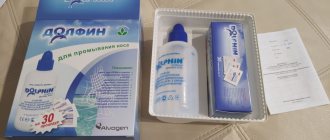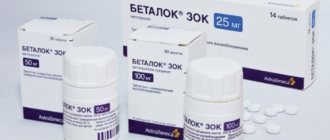Xymelin Eco with menthol nasal spray 0.1% 10ml
pharmachologic effect
Xymelin is a vasoconstrictor drug for local use in ENT practice, an alpha-adrenergic agonist. Causes a narrowing of the blood vessels of the nasal mucosa, thus eliminating swelling and hyperemia of the nasopharyngeal mucosa. Facilitates nasal breathing during rhinitis. In therapeutic doses it does not irritate the mucous membranes and does not cause hyperemia. The action occurs within a few minutes and lasts for 10-12 hours.
Indications
- acute respiratory diseases with symptoms of rhinitis (runny nose);
- acute allergic rhinitis;
- hay fever;
- sinusitis;
- eustachitis;
- otitis media (to reduce swelling of the nasopharyngeal mucosa);
- preparing the patient for diagnostic manipulations in the nasal passages.
Contraindications
- arterial hypertension;
- tachycardia;
- severe atherosclerosis;
- glaucoma;
- atrophic rhinitis;
- thyrotoxicosis;
- surgical interventions on the meninges (history);
- pregnancy;
- children under 6 years of age;
- hypersensitivity to the components of the drug.
With caution: the drug should be used for diabetes mellitus, angina pectoris of functional class III-IV, prostatic hyperplasia.
Use during pregnancy and breastfeeding
During pregnancy and lactation, the drug should be used only after a thorough assessment of the risk-benefit ratio for the mother and fetus; recommended doses should not be exceeded.
special instructions
Should not be used for a long time, for example for chronic rhinitis.
Compound
1 ml spray contains:
Active substance: xylometazoline hydrochloride 1 mg;
Excipients: sodium phosphate monosubstituted; sodium phosphate disubstituted; disodium edetate; sodium chloride; benzalkonium chloride; purified water.
Directions for use and doses
Apply topically for 7-14 days. The dose depends on the dosage form used and the age of the patient.
Side effects
Local reactions: with frequent and/or prolonged use - irritation and/or dryness of the nasopharyngeal mucosa, burning, tingling, sneezing, hypersecretion; rarely – swelling of the nasal mucosa.
Systemic reactions: rarely - palpitations, tachycardia, arrhythmias, increased blood pressure, headache, vomiting, insomnia, blurred vision; with long-term use in high doses - depression.
Drug interactions
Incompatible with MAO inhibitors and tricyclic antidepressants.
Overdose
Symptoms: increased side effects.
Treatment: symptomatic therapy.
Storage conditions
Store at a temperature not exceeding 25 °C.
Best before date
2 years
Xymelin IVF with menthol nasal spray 140 µg/dose vial 10 ml
Indications
- acute respiratory diseases with symptoms of rhinitis (runny nose);
- acute allergic rhinitis;
- hay fever;
- sinusitis;
- eustachitis;
- otitis media (to reduce swelling of the nasopharyngeal mucosa);
- preparing the patient for diagnostic manipulations in the nasal passages.
pharmachologic effect
Xylometazoline belongs to the group of local vasoconstrictors (decongestants) with an alpha-adrenomimetic effect; it causes constriction of the blood vessels of the nasal mucosa, thus eliminating swelling and hyperemia of the nasopharyngeal mucosa.
Xylometazoline also reduces the accompanying hypersecretion of mucus and facilitates the drainage of nasal passages blocked by secretions and thus improves nasal breathing during nasal congestion.
In therapeutic doses it does not irritate the mucous membranes and does not cause hyperemia. The effect occurs 2 minutes after application and continues for 12 hours.
In vitro studies have shown that xylometazoline inhibits the infectivity of human rhinovirus, which causes the common cold.
Drug interactions
The use of xylometazoline is contraindicated in patients receiving MAO inhibitors or tricyclic antidepressants, including the period of 14 days after their discontinuation.
The simultaneous use of tri- or tetracyclic antidepressants and sympathomimetics may lead to an increase in the sympathomimetic effect of xylometazoline, so this combination is recommended to be avoided.
Dosage regimen
The drug is used intranasally.
Adults and children over 10 years old - 1 injection into each nasal passage, reapply the drug if necessary. Frequency of use: no more than 3 times/day. The duration of treatment is no more than 10 days.
Overdose
Symptoms: xylometazoline, when administered locally in an excessive dose or accidentally ingested, can cause severe dizziness, increased and uneven pulse, increased sweating, a sharp decrease in body temperature, headache, drowsiness, bradycardia, increased blood pressure, respiratory depression, coma and convulsions. Following an increase in blood pressure, a sharp decrease may be observed.
Treatment: Appropriate supportive measures should be taken if overdose is suspected. In some cases, immediate symptomatic treatment under medical supervision is indicated. These measures should include monitoring the patient for several hours. In case of severe poisoning with cardiac arrest, resuscitation efforts should last at least 1 hour.
Contraindications for use
- hypersensitivity to xylometazoline and other components of the drug;
- arterial hypertension;
- tachycardia;
- severe atherosclerosis;
- glaucoma;
- dry rhinitis or atrophic rhinitis;
- hyperthyroidism;
- condition after transsphenoidal hypophysectomy;
- surgical interventions on the meninges (history);
- pregnancy;
- children under 10 years of age;
- therapy with MAO inhibitors or tricyclic antidepressants, including a period of 14 days after their discontinuation.
With caution: diabetes mellitus; pheochromocytoma; diseases of the cardiovascular system, incl. IHD, angina pectoris III-IV functional class; porphyria; breastfeeding period; prostatic hyperplasia; atherosclerosis; with increased sensitivity to adrenergic drugs, accompanied by insomnia, dizziness, arrhythmia, tremor, increased blood pressure.
Use in children
Contraindicated in children under 10 years of age.
Restrictions for children
Use with caution
Use during pregnancy and breastfeeding
The use of the drug is contraindicated during pregnancy.
During breastfeeding, the drug should be used only after a careful assessment of the balance of benefits and risks for the mother and child, under the supervision of a physician. Do not exceed the recommended dose.
Restrictions when breastfeeding
Use with caution
Restrictions during pregnancy
Contraindicated
Storage conditions
The drug should be stored out of the reach of children at a temperature not exceeding 30°C.
Terms of sale
The drug is available without a prescription.
special instructions
The drug should not be used for a long time (more than 10 days).
Long-term (more than 10 days) or excessive use of the drug can cause a rebound effect (medicinal rhinitis) and/or atrophy of the nasal mucosa.
Do not exceed recommended doses, especially in children and the elderly.
If the symptoms of the disease worsen or the patient's condition does not improve within 3 days of using the drug, you should consult your doctor.
Side effect
Classification of the frequency of occurrence of adverse reactions: very often (≥1/10); often (≥1/100,
From the immune system: very rarely - hypersensitivity reactions (angioedema, rash, itching).
From the nervous system: often - headache; rarely - insomnia, depression (with long-term use in high doses); very rarely - hallucinations and convulsions (mainly in children).
On the part of the organ of vision: very rarely - impaired clarity of visual perception.
From the cardiovascular system: rarely - palpitations, increased blood pressure; very rarely - tachycardia, arrhythmia.
From the respiratory system: often - irritation and/or dryness of the nasal mucosa, burning, tingling, sneezing, hypersecretion of the nasopharyngeal mucosa; rarely - nosebleeds.
From the digestive system: often - nausea; rarely - vomiting.
General disorders and disorders at the injection site: often - burning at the application site.
If any of the side effects indicated in the instructions are aggravated or other side effects not listed in the instructions are noted, the patient should inform the doctor.
Possible product names
- Xymelin IVF with menthol nasal spray 140 µg/dose 1 mg/ml fl. 10 ml
- XYMELIN ECO 0.1% SPRAY MENTHOL 10 ML
- XYMELIN ECO WITH MENTHOL 140MCG/DOSE 10ML NAZ SPRAY
- XYMELIN ECO WITH MENTHOL NASAL SPRAY. DOSE 140 MCG/DOSE FL. PLAST. 10 ML.
- XYMELIN ECO WITH MENTHOL SPRAY NAME. 0.1% FL. 10ML
- XYMELIN ECO WITH MENTHOL 140MCG/DOSE NASAL SPRAY DOSER. 10ML FL. X1 (R)
- (Xymelin Eco) Xymelin Eco with menthol nasal spray 140 µg/dose 1 mg/ml fl. 10 ml



